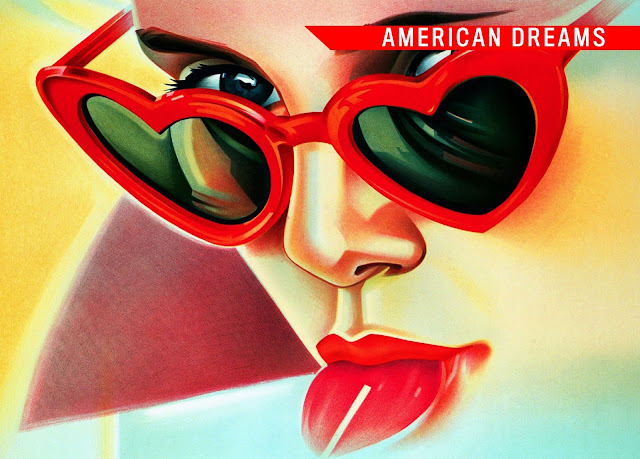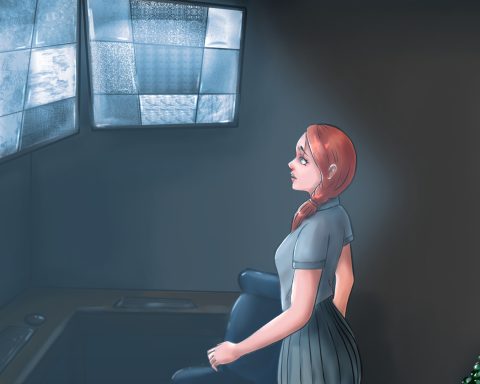Article by Matt S.
Vladimir Nabokov’s Lolita is one of the greatest books in the history of literature. Nabokov’s observations on the American culture that underpin the book, and his subsequent deconstruction of it through darkly transgressive humour, is by turns humorous and shocking, but at all times it’s breathtaking in the sheer beauty of the writing, the poetic flow of the prose, and the vivid imagery that manages to both disturb and delight.
The extreme nature of the content, and the way that book is treated and analysed within the literature community, makes for a useful example of just how underdeveloped critical thinking and the understanding of art is in gaming, I feel. Or, to put it simply, if Lolita was a game we would be talking about it very differently to how we do as a book (or film, for that matter).
Lolita is, of course, a book about a man that marries the mother of a child, manages to get her killed, and then embarks on a trip across America with the aforementioned child, engaging in a sexual relationship with (or, to put it more accurately, repeated molestation of) her. Even if you haven’t read it yet, I’ve no doubt you’re aware of that surface-level narrative. Everyone is. The seedy linguistic connotations we have to the word “lolita” come from that book.
But even a cursory analysis of the book makes its social critiques all-too-obvious, and the book reminds us over, and over, again just how subversive it is to the western culture context it is placed within. As Heather Menzies Jones writes in her thesis essay Nabokov’s Dark American Dream: Pedophilia, Poe, and Postmodernism in Lolita: “James Kincaid ‘s … [writings on Nabokov] that pedophilia is inevitable in American culture which has invested itself so heavily in the eroticizing of the child. While Kincaid does not allude to Nabokov or Lolita in particular, his work is important … because I believe that Nabokov was uniquely prescient about the way an American identity has been shaped after the World War and the extent of our child-loving is an important component of this identity.” (To read the whole essay: http://chem.chem.rochester.edu/~wdjgrp/H-thesis.pdf)
Lolita is a controversial book (though less so today then when it was first published). Of course it is a controversial book. It focuses almost exclusively on one of the few universal taboos left in our western culture that we universally abhor, and it has the audacity to highlight that, actually, the taboo is still a drive into the mainstream of our culture. The book faced bans and censorship around the world, and Nabokov was (and to some extent, still is) criticised intensely in both academic and mainstream circles for writing it. But, importantly to what I’m about to write below, he was also defended rigorously and his book has been analysed to a far deeper level than its surface-level narrative.
The purpose of this piece isn’t to debate that book. My thoughts on it are generally as I’ve outlined above; I believe it to be one of the greatest novels that have ever been written. But the purpose of this article is separate. Instead, what I’m doing with this piece is asking a very simple question; imagine if Lolita was a game? Ignore for a moment that the actual content of the book wouldn’t make for a particularly exciting game, but consider the narrative, in isolation, was somehow turned into an interesting adventure game or similar. Imagine that, in every other way other than its medium, it was the same experience as the book. Imagine that it was a similarly deep, important narrative experience, and it had powerful cultural commentary to make. That it shocked, yes, but it used that shock to drive home observations about a culture that so rarely reflects upon itself. Imagine that it was darkly comedic and subversive, and that it was transgressive. Imagine if Lolita: The Game was all of that, and then ask yourself; how would the community and majority of the critical body have responded to it?
I think, deep down, that we all know the answer there. I think, deep down, we already know that pitchforks would be rapidly sharpened at the mere thought of such a game.
How do I think we know this to be the case? There are dozens of far lesser examples in the games industry already of the kind of response we could expect from Lolita: The Game. With Lolita being a book that takes its themes to an extreme, the only logical conclusion to draw is that the critical body would respond to it in a far more extreme manner. So, consider some of the below as just a few examples of precedents that prove Lolita: The Game would not be tolerated:
1) There are a raft of games that you’re not allowed to stream on the most popular game streaming site, Twitch, and you’re not allowed to talk about on one of the most popular gaming communities, NeoGAF. Be that Dead or Alive Xtreme 3 or Criminal Girls, there are clear and concentrated efforts to stifle the conversations around these games by limiting the platforms that they can appear on.
These sites are, of course, entitled to do this. I’m not suggesting otherwise. But they have made the executive decision to block discussions about these games through their platforms, and one would have to assume that our hypothetical Lolita: The Game would likewise blocked. This is a problem because the power and value of Lolita: The Book is that it has generated such heated discussion and healthy debate over the years. Decades after the book was first published people are still reading and responding to essays and thoughts on the book. It’s still studied at universities around the world. It’s readily available in most decent book stores. That all-important cross-generational and cross-cultural analysis and discussion is a key reason Lolita: The Book is so important, and it needed to be dissected and discussed by a critical mass of people to achieve that.
2) Additional to that, the actual console manufacturers and distribution platform holders won’t allow such games to appear on their shop fronts. Ever. Sony, Microsoft, Nintendo, and Valve would, based on previous behaviours, all refuse to allow the game to be licensed to their platforms. Which is roughly the equivalent of banning a book from 99 per cent of book stores.
Again, all those platform holders are well within their rights to do such a thing, but again, part of the power and importance of Lolita: The Book is that it is readily available and relatively widely read.
3) The critics would tear Lolita: the Game to shreds based on nothing more than the gut reaction morality of the game critic in question. There is ample precedent to back this up here. There are many examples of game critics deriding and criticising games they haven’t played, based on sexualised content that they know either by reputation or gameplay videos. Of keen relevance to our hypothetical Lolita: The Game, characters perceived to be underage have been the subject of the most harsh criticism of all, and again, without the critic experiencing the character in the context of the game. That is functionally the same as judging Lolita: The Book on my summary provided above and without having read it.
What the game critics get up to when they do this is, of course, poor criticism. It is completely unacceptable in literature circles to form opinions on books you haven’t read. Ergo, the overwhelming likelihood is that if a professional literature writer is criticising Lolita, they are doing so from a position of expertise, and that makes it valid whether I, or anyone else, agree or disagree. Unfortunately, the assumption of expertise simply can’t be made of game critics, and it’s often by their own admission.
Critics celebrated the removal of a swimwear costume for a 13-year old character in Xenoblade Chronicles X for being the “moral” thing to do without having played the game. In that case the swimwear didn’t add anything to the narrative so it turns out that it was irrelevant that it was removed, but in another instance (Fatal Frame: Maiden of Dark Water), critics celebrated the removal of swimwear from characters that in context is a horror game in which a central motif was the interaction between the body and water. In that instance, the content’s removal lessened the artistic integrity of the game.
In other words, in the games industry, there’s an assumption that after watching some clips or trailers and reading a feature set you’re good to go and form complex opinions on the game in question. But that’s an example of the Dunning-Krueger effect at play in a best-case scenario. Based on all the above Lolita: The Game would find itself the target of a swarm of protest in the media before it had even landed, and it may have been subjected to the removal of content that would actually have been important to the overall storytelling.
4) Across all discussions on the game it’s worth noting that in this criticism the quality and deeper themes aren’t necessarily important points on the agenda. With Lolita: The Game, the media and the community alike would see an exploitative example of illegal perversion on face value, regardless of the point it was making with that content, and would write it up as such. It wouldn’t matter that it’s a subversive dissection of American culture. It wouldn’t matter that it’s actually a dark satire at work. There would be no consideration put to the reason that the novel over and over again works as a homage to Edgar Allan Poe, or why his own body of work might be important to the greater context of the game. All that the majority of the audience would see would be the literal, surface meanings of the text, and while they might go as far as to recognise that it was “well written”, rarely would a critic go much beyond that to start exploring why the narrative is the way it is.
There’s ample precedent for that too in the games industry. Lollipop Chainsaw, though nowhere near as controversial as Lolita: The Game would be, was nonetheless panned by both critics and audience who never quite got around to recognising that it was a subversive game in almost every sense, and it was panned because it featured sexualised content. The closest a lot of the discussions got to recognising that there was subversion running through Lollipop Chainsaw is in recognising that the game’s protagonist, Juliet Starling, was “like Buffy and kicked butt,” which isn’t exactly the kind of analysis the game deserved.
5) Heaven save anyone who would actually try and defend Lolita: The Game, on any of the same grounds that most literature critics celebrate the book for today. The pitchforks would be turned on them right fast, no matter how complex or in-depth the analysis came in supporting the work.
An ex-Nintendo staffer once wrote an essay in opposition to cultural imperialism being pushed from the west on to Japan, and in the process had the audacity to suggest that a subset of the Japanese sense of artistic aesthetic that we commonly see in anime, manga, and games, which does sexualise youth, should not be removed from the culture on the mandate of the west. That woman has since been incorrectly categorised by a mob as being in support of pedophilia, and has been harassed over that to this day. (Note, that I’ve mentioned this in this article is not an invitation to discuss it in comments, and I will be moderating in kind. Please keep those debates to Twitter or wherever.)
The reason I bring this up is that in the games industry there is precedent to suggest that it would not be considered kosher to argue that Lolita: The Game is a masterpiece, and that’s a contrast to what we see in literature circles, where people are able to debate both sides on the merits of Lolita: The Book without fear of being painted as something very nasty. In the literature space art is understood to be art and people understand that transgressive or subversive works are a cornerstone of the very meaning of art. They might not agree with the positions that other critics and readers might take, but they understand the value in having them.
But would that happen in the games space? No. Unfortunately the greatest strike against any case we might make for games as an art form is the idea that genuine transgressive ideas are not acceptable. They’re simply not tolerated by a critical mass of people that make the condemnation of them the standard. This applies equally to the actual community, artists and art critics, and beyond that to the broad community. The industry as a collective does look to lynch anyone who goes truly against the grain and says or does something truly transgressive.
Based on all the above, I think it’s a safe call to say that Lolita: The Game would not be tolerated. In no small part because of that, we should all be frankly questioning the value of our medium as a means of artistic expression when a game that would be as powerful, provocative and important as Lolita would be subjected to the digital equivalent of a book burning.
– Matt S.
Editor-in-Chief
Find me on Twitter: @digitallydownld







